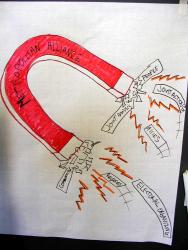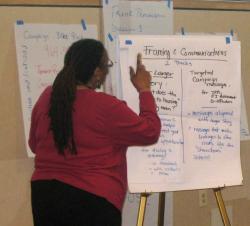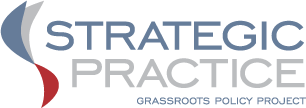Our Trainings
Power Analysis
 Power is an integral part of our work as organizers and activists—it is something we deal with all the time. Power plays a role in shaping patterns of social relationships and human interactions in almost every sphere of our lives. A good power analysis provides a necessary context for developing long-term strategies for shifting power relations in society.
Power is an integral part of our work as organizers and activists—it is something we deal with all the time. Power plays a role in shaping patterns of social relationships and human interactions in almost every sphere of our lives. A good power analysis provides a necessary context for developing long-term strategies for shifting power relations in society.
Power Mapping. Organizers and educators have developed a number of interactive tools that help groups draw a picture or develop a map of power relations—in society as a whole, in a state or region, or in a specific community. We have tried out a lot of these tools: force field analysis, community scanning, etc. One of our favorites is power mapping.
The power mapping process enables participants to do their own analysis of power relations in their region and to connect it to power relations on national and global levels. Mapping builds off of participants’ knowledge of their own towns, counties, and states. The end product is something that they create collectively.
Power mapping activities:
- Creating a Power Map (2 hours version) [coming soon]
- Power Mapping (weekend version) [coming soon]
The Three Faces of Power. While power maps provide a good visual, they tend to be one-dimensional. Over the years we have experimented with ways to supplement mapping with activities that depict the multi-dimensionality of power. Here we have included different ways that we introduce the three faces in workshops. They combine some presentation with more interactive elements, including an activity that involves physical representations of power, reminiscent of political theatre.
Three Faces of Power activities:
- Introducing the Three Faces of Power [coming soon]
- Three Faces of Power Diagram
Worldview and Narrative
 Our activities and discussions include ways to introduce the concept of worldview and apply it to framing and message development. More recently, we’ve worked intensively with several groups on developing their own narratives. These narratives convey the group’s beliefs and vision for a transformed society.
Our activities and discussions include ways to introduce the concept of worldview and apply it to framing and message development. More recently, we’ve worked intensively with several groups on developing their own narratives. These narratives convey the group’s beliefs and vision for a transformed society.
Our worldview and narrative trainings include:
Racial Justice
We bring a racial justice analysis into our writings and trainings about economic justice, not just in terms of pointing out disparities in jobs, wealth accumulation, access to capital, etc., but as a way of addressing the intersectionality of racial and economic oppression.
Our trainings on structural racism and racial justice explore the following:
- The role of race in shaping all of our economic and social institutions throughout US history as well as the cumulative effects of racialization, which include race-based inequities and disparities;
- The linkages between systems of racial oppression and persistent economic oppression.
- Lessons from the rich history of struggles for racial and economic justice.
- The ways in which social change organizers can bring racial justice into all areas of our work, and how, in doing so, we can achieve more fundamental and systemic levels of change in society.
Our materials on racial justice include a comprehensive workbook about dismantling structural racism that we developed for National People’s Action:
- Race, Power and Policy: Dismantling Structural Racism
- Intersections of Race, Class and Gender [coming soon]
Corporate Power and the Political Economy
GPP develops political education tools for analyzing the political economy, and how to change it. When groups of people have opportunities to talk about economics in the context of the political economy, three things usually surface:
- They know a lot more about the economy than they realize.
- Their own experiences don’t necessarily match the rhetoric about the ‘free market’ that dominates discourses about economics.
- They think the economy should work for everyone, not just the privileged few, and that government should play a role in making this happen. At the same time, they see the ‘government’ as having been captured by powerful economic interests --- big corporations and Wall Street.
When given a chance to dig deeper, people will call into question the notion that the ‘economy’ is a ‘thing,’ or a force of nature. They start to see the economy as a political construct. And the question becomes, who controls the way in which it is constructed?
These discussions bring us to the role of corporations and Wall Street in dominating the political economy. We see actions and campaigns that challenge corporate power as essential elements in a strategy for a new economy that is consistent with real democracy.
Here we include a workshop we developed for National People’s Action on the rise of corporate power:
Other Training Materials:
These are comprehensive weekend workshop we did with several statewide groups in the Northeast and Midwest on power, worldview and strategy:
These materials are free to all. We just ask that you let us know how you are using our materials and give us credit when you use or reproduce them. Also, we encourage you to contact us to discuss ways of tailoring these activities for your particular needs.
Do you have training resources you’d like to suggest or share with us? Do you have feedback on our materials? We welcome your suggestions.

